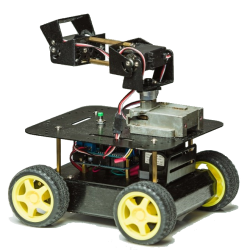Evil masquerading as good
We are used to book heroes fighting on the side of good, for justice, and order. However, in reality, the concept of good and evil is relative. There are forces that intend to destroy everything living, usually considered evil, and fought against in every possible way. These forces are often associated with darkness, chaos, evil, and death, while goodness, order, light, and life act as their counterbalance. It is logical for heroes to belong to the latter camp.
Occasionally, the "light" forces are far from the ideals ascribed to them. The initially good intentions attributed to them can have the opposite effect and be harmful. This is often due to the fact that good and light resist change, leading to stagnation. Being at peace and leading a well-fed, peaceful life seems like a blessing, but in the long term, it leads to degradation and weakening. Attempts at change may face active opposition from precisely the “good” forces that consider the order of things to be the only correct one.
In contrast, darkness and chaos symbolize freedom and the thirst for constant change. Changes may come at a price, and the life of one or many people can change for the worse or be interrupted altogether. But the world develops, not standing still in peace and satiety.
Sometimes, "light" forces become their opposite, using the usual magic of light and life to do evil. Ordinary people will sincerely believe that everything is fine since they have been explained that everything the forces of light do is for the good. But to the reader, who can look at everything from the outside, it becomes clear that everything is going wrong.
Here comes the main character, who begins the fight for real good. Since he opposes the “light” forces, everyone around him considers him evil. The hero can be a magician of darkness, death, a necromancer, or another representative of “evil.” The methods he uses will cause rejection among others.
The hero may raise the dead, summon demons, perform sacrifices, and do other repulsive things. However, he does not do this because he enjoys doing evil, but because he has no other choice in the current situation. The global goals he sets for himself will be very different from the usual desire for strength and power attributed to evil characters.
We deal with the "lesser evil" problem that often arises in complex plots. Do we have the right to use inherently bad and evil methods to achieve good goals? Will the sacrifices we were forced to make devalue the goal achieved? The author and their characters often conclude that a small sacrifice is worth the result achieved. However, not everyone agrees with this, and the hero faces negative attitudes from those around him, even his own relatives.
As the scale of action grows, the problem of the “lesser evil” does not go away but gets worse. Now the hero is forced to commit more and more evil acts to avoid even greater consequences. Armies of the dead are used, human sacrifices are made, demons are summoned, or an agreement is concluded by chaotic forces. The hero agrees to pay the appropriate price so that a global catastrophe does not occur.
Books with “evil” characters are generally common. After all, it’s boring to watch a habitually kind and law-abiding hero. It is much more interesting to empathize with a character who finds himself, either by choice or accident, in the opposite camp. Especially if it becomes clear that despite the methods used, appearance, and other attributes of evil, in reality, he follows the path of good.
A series of books by Mikhail Demchenko "Hunter from the Shadow". Books 1-5

Author: Demchenko A.V.
If you grew up on the ruins of civilization, you see how your world is slowly degenerating and dying, cruel, ugly, but familiar and dear, and fate suddenly throws up an incredible chance to start all over again... You will grab onto it with your hands and feet. You will escape from the stench and malice of those around you since birth, you will go to other worlds and see that not everything is in order there either. And in seemingly prosperous countries, evil, hatred, and greed are also brewing. So was it worth changing one for the other? Timm thinks it is worth it. There, in a world dying from radiation contamination and mutations, only the grave of his only relative remained, whose name he did not even know. And here... There are no thermonuclear charges, chemical or bacteriological weapons, and trouble is still oh so far away. And if she does come, her brother-friends will stand to meet her, next to Timm, shoulder to shoulder. And even if there is not a single person among them, even if they are called the Spawns of Chaos and the Children of the Night, what does it matter if they are devoted to each other, and will always help to get out of any trouble...

 Books
Books Fantasy
Fantasy Fiction
Fiction Humorous
Humorous Heroic
Heroic  Science fiction
Science fiction Political
Political Alternative history
Alternative history LitRPG
LitRPG Steampunk
Steampunk Social fiction
Social fiction Psychological
Psychological Accidental travel
Accidental travel Dark fantasy
Dark fantasy Intrigue
Intrigue Detective story
Detective story All tags
All tags Technology
Technology Electronics
Electronics Programming
Programming Weaponry
Weaponry Arduino
Arduino Projects
Projects